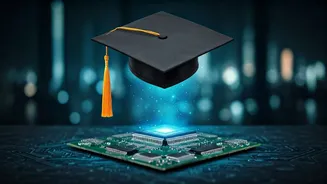Huang's Unexpected Admission
Nvidia's CEO, Jensen Huang, made a notable statement to Mark Zuckerberg about his college experience. Huang revealed that, if he had the knowledge available
today, he might have chosen a different path and dropped out of college altogether. This comment, made in the context of their conversation, highlights the transformative changes in the tech landscape and the shifting perspectives on traditional education. The statement underscores a potential reassessment of higher education's relevance in the context of rapid technological progress, and the value placed on practical experience and on-the-job learning. This admission opens up questions regarding the evolution of skills and knowledge in the tech industry, and the possible divergence between academic training and practical field expertise.
Contextual Significance of Statement
Huang's comment is particularly significant given the current climate of technological advancement. The tech industry continually evolves at an unprecedented pace, demanding skills and specializations that may not align with the standard curricula offered by colleges and universities. The emphasis on hands-on experience, entrepreneurial ventures, and rapid skill acquisition is growing. The declaration highlights a possible divergence between traditional education and the requirements of the tech sector. Furthermore, it underlines the increasing value placed on self-directed learning, digital resources, and specialized training programs. The context is crucial: Huang’s sentiment resonates within a rapidly changing industry that may prioritize skills acquired outside of the confines of a traditional university setting, with a focus on practical application and continual adaptation.
Tech Leaders' Perspectives
Huang’s views echo broader conversations among tech leaders. Many successful figures in the industry have either departed from formal educational structures or, like Huang, have come to question the exclusive merits of a four-year degree. There is a growing inclination to emphasize practical knowledge, innovation, and industry-specific training. Figures such as Elon Musk and Mark Zuckerberg have similarly challenged traditional education models. These attitudes could lead to the exploration of alternative educational pathways, from immersive boot camps to micro-credentials and specialized training. These leaders appear to place a high value on self-initiative and a capacity for rapid learning, adapting to the dynamic demands of their sector. This perspective underlines the evolving criteria for success in the tech industry, placing a higher premium on practical expertise and entrepreneurial drive.
Future Implications and Trends
Huang's statement carries several implications for the future of education and the tech sector. It highlights the possible shift away from traditional degree programs toward flexible learning models that align better with industry requirements. The trend could accelerate the growth of online educational resources, immersive training programs, and industry-focused certifications. Moreover, it encourages continuous professional development as a crucial component of career development. Moreover, it underscores the need for educational institutions to adapt their curricula to remain relevant, placing an emphasis on practical application, innovative problem-solving, and the integration of emerging technologies. Finally, the statement also underscores the significance of cultivating entrepreneurial mindsets, encouraging innovation, and fostering a capacity for adaptability in the rapidly changing tech field.




















